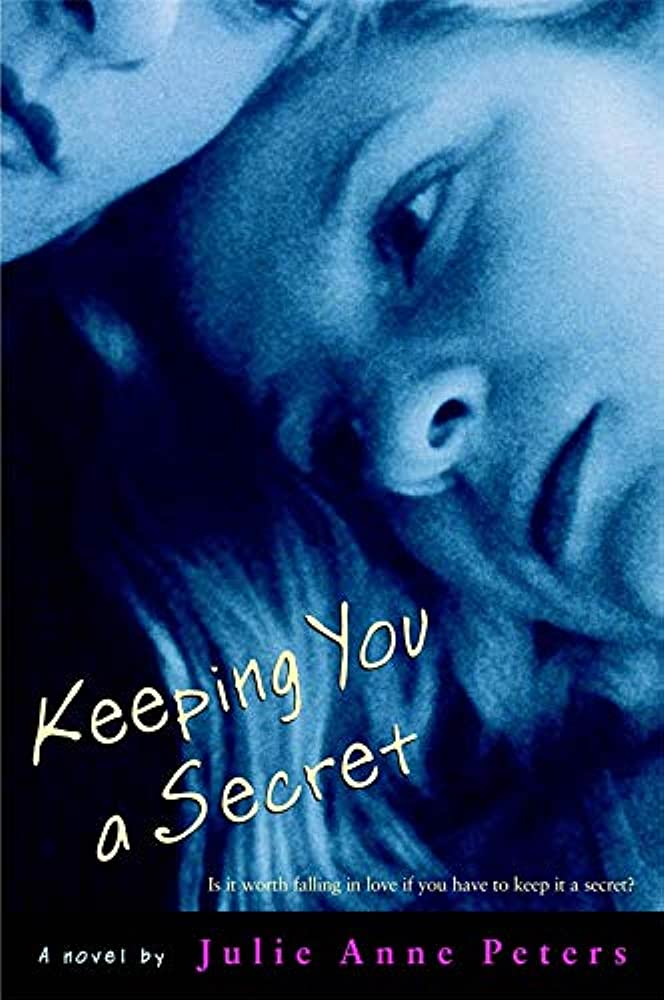Credit to Little, Brown
The first time I ever saw Julie Ann Peters’ Keeping You a Secret was at the foot of my mom’s bed, face up and daunting. The image on the cover might have inspired less wariness if my mother hadn’t already informed me of the contents of the book, because I knew the image was not simply indicative of two female characters. It was indicative of two female characters in love.
I couldn’t even bring myself to read the back. Every time my mom made mention of it, I felt rattled.
The first time I ever touched Keeping You a Secret was in and amongst the rows of books in my middle school library, where it lay tucked away between two other unassuming Young Adult novels. I remember reaching forward to slide it out gingerly, so I could read the summary I had dared hardly to glance at in my home. “Insert some of summary.”
I remember shrugging and telling my mom maybe I’d give it a try, and I remember finishing it within the course of a day.
I do not mean to relate to you this experience in order to assert this book was only useful to me as a thirteen year old on the brink of coming out to myself. Instead, I am telling you because I think there is something deeply personal about this book, and that there is some piece of Holland in every single person who has ever struggled with and suffered for any part of themselves they could not change; I am telling you this because this book’s publication inspired hundreds upon hundreds of people to send stories of their own to an unsuspecting Peters—stories of their coming out, stories of how the book had helped them to face their own sexuality or to accept their own sexuality. Sometimes, they were letters merely of thanks: that a world existed which not only understood but celebrated them for who they were, and for who they could become. Yes, when it was published in 2003 it was one of the only Young Adult books addressing the topic of coming out, or of LGBT youth in general.
The novel itself opens with the protagonist, Holland, catching sight of the new girl at her high school for the first time, a girl who later introduces herself as Cece. Thus, the tale begins with that first moment of uncertainty, stirring in the pit of her stomach, sharpened by the bold statement scrawled on the front of Cece’s T-shirt: IMRU? It is an unsettling a question to Holland, even though she does not fully understand its context, as it was to me, from the very first page. Am I what?
Peters crafts as much a coming out story as she does a coming-of-age story, for the two become as inextricably intertwined as they so often are in real lives of LGBT teenagers. We are introduced almost immediately to Holland’s preparations for her college future, as she struggles with juggling the crushing weight of her mother’s expectations for her future while with her own uncertainty. It is altogether too relatable a struggle of the search for independence, of allowing herself to become a thing that is different than her mother ever intended her to be. Of allowing herself to be become something that isn’t her mother at all.
Peters does not waste time on unnecessary words; the vocabulary is not elevated, but each choice is made deliberately, and each word is therefore infused with emotion, with energy. There is no excessive beating around the bush, no languid, flowering language in which to stew. Each word echoes with meaning, and truth, and sets the brutal pace of a fast-approaching future. Indeed, in one of her most powerful moments, at the crescendo of Holland’s desperation, Peters writes simply, “This was wrong. He was wrong. It was all so wrong.”
It is the absoluteness of this simplicity at these climax of emotion that will inspire so immediate and feeling a reaction in its readers. At the moments in which she loses everything, we feel the sharp sting of each period, the stuttering of each ellipsis, the acrid taste of each article in the back of our throat as we mouth the words in horror.
By its conclusion, it is a recognizably cathartic piece of work: the trajectory of Holland’s story is both devastating and inspiring—ripe with despair and weightless with the breathtaking hope of possibility.
In the end, it does not matter whether readers are still struggling with facing their own sexuality—with their own feeling of isolation, or loneliness, or apart-ness—or whether they are in the process of coming out the people around them or whether they have been out and proud for years. In the end, the reader’s sexuality becomes irrelevant.
This is the profoundly complex and profoundly terrifying story of a girl who struggles with her own self-identity only to lose so many of the people she never thought could stop loving her. But it is also the story of a girl who discovers the courage required to claim the final piece of herself, and it is the story of the people who love her without conditions.
This is the profoundly simple and profoundly moving story of a girl who falls in love with a girl.

